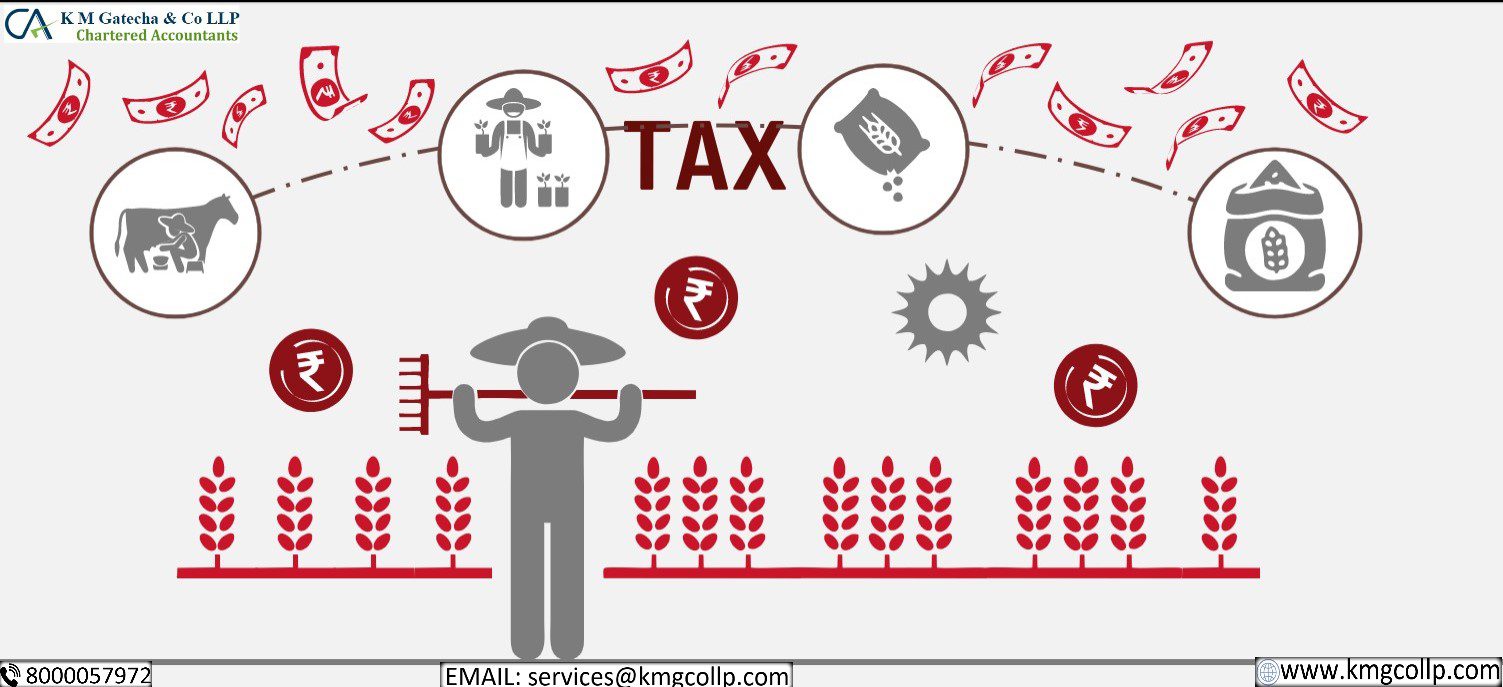Agriculture is the primary source of livelihood and source of income for about 58% of India’s population. As we all know that income which is received from agricultural activities know as agricultural income. In this article we have discussed all about the ‘Taxability of Agricultural Income in India‘. Agricultural income is fully exempted from taxation and not included in total income. The Central Government can’t impose or levy tax on agricultural income under Section 10 (1) of the Income Tax Act of India. However, the state government can levy tax on agricultural income if the amount exceeds Rs.5,000 per year. Agricultural income is defined under section 2(1A) of the income tax act 1961, According to this Section, there are 3 conditions to consider as agricultural income under the sec. 2(1):
- Income derived from the land
- Land should be in India
- Land must have been used for agricultural purposes only
What is considered as Agricultural Income?
- Any rent or revenue derived from land which is situated within the boundaries of India and is used for agricultural purposes only.
- Income directly derived from such land by agriculture operations including processing of agricultural produce so as render it fit for the market or sale of such produce. And any rent or revenue received from the tenants -through lease/sublease.
- Any income attributable to a farmhouse subject to satisfaction of certain conditions specified in this regard in section 2(1A).
- Any income derived from saplings or seedlings grown in a nursery shall be deemed to be agricultural income.
Is Agricultural Income Taxable in India?
As we discussed above, Agricultural income is fully exempted from taxation and not included in total income. The Central Government can’t impose or levy tax on agricultural income under Section 10 (1) of the Income Tax Act of India. However, state governments can impose the agricultural tax. As per the latest amendment, if agricultural income is below INR 5000 in a financial year, will not be taxable under the exemption clause of section 10 (1) of the income tax act of India. Anything above from INR 5000, will be taxable as per the applicable rates. However, agricultural income is considered for tax rate purposes while assessing the income tax liability if the following two conditions are satisfied:
- Net agricultural income is greater than INR 5,000/- for the previous financial year.
- Total income, excluding net agricultural income, surpasses the basic exemption limit (Rs. 2,50,000 for individuals below 60 years of age and Rs. 3,00,000 for individuals above 60 years of age).
Computation of taxable agricultural income
The tax calculation done here is following the fact that the income from agricultural sources is mentioned under Section 2 (1A) of the Income-tax Act.
Including the Agricultural Income (Non-Agricultural Income + Net Agricultural Income)– Considering X is the non-agricultural income of the individual and Y is the agricultural income, tax first needs to be computed on the amount of X + Y. Let’s call this tax T (X + Y)
Adding the basic tax slab benefit (Net agricultural income + Maximum exemption limit as per slabs rates) – Depending upon changes in the Income Tax Rules, the basic tax slab might change, but for clarity’s sake, let’s consider that as A. That needs to be added to the agricultural income and another tax is calculated on the amount. Let’s call this tax T (A + Y)
Income Tax liability (calculate of final tax) – This is the tax that is subject to deductions. Thus, Income Tax= T (X + Y)– T (A + Y)
One should always remember to aggregate the agricultural income while calculating tax since that can allow one to avoid unnecessary extra taxes or interest on taxes.
Section 54B: Exemption on Sale of Agricultural Land
Exemption under section 54B of the Income Tax Act is available on Capital Gains on the sale of agricultural land and purchase of new agricultural land. The amount of Exemption under Section 54B will be lower of:
- The Cost of new Agricultural land,
- The Capital Gains on the sale of Agricultural land.
A taxpayer can claim exemption u/s 54B if
- The taxpayer is an Individual or HUF. The benefit of exemption u/s 54 is not available to the company, LLP, or Firm.
- The agricultural land sold is a Long-Term Capital Asset (Sold after relevant 2 years) or Short-Term Capital Asset.
- The agricultural land sold is used for agricultural purposes by the individual / his parent / HUF for 2 years before transfer.
- New Agricultural land is purchased within 2 years from the sale of the agricultural land.
- A new Agricultural land must be in India.
Frequently Asked Questions
Agricultural income is fully exempted from taxation and not included in total income. The Central Government can’t impose or levy tax on agricultural income under Section 10 (1) of the Income Tax Act of India. However, state governments can impose the agricultural tax.
Agriculture income is calculated by deducting the expenses of agriculture from the agriculture income.
As per the latest amendment, if agricultural income is below INR 5000 in a financial year, will not be taxable under the exemption clause of section 10 (1) of the income tax act of India. Anything above INR 5000, will be taxable as per the applicable rates.
Table of Contents
Toggle


